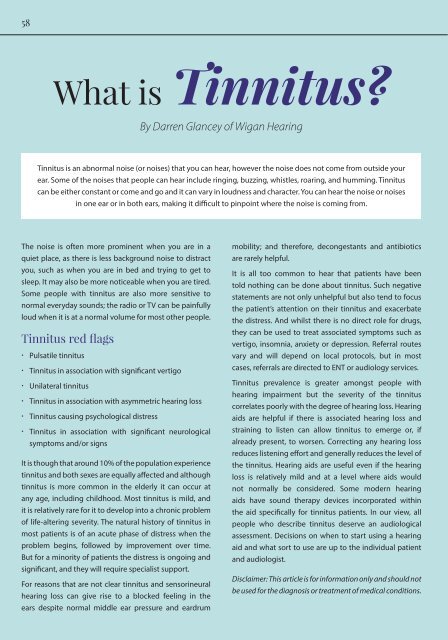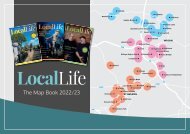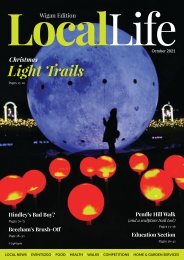Create successful ePaper yourself
Turn your PDF publications into a flip-book with our unique Google optimized e-Paper software.
58<br />
What is Tinnitus?<br />
By Darren Glancey of <strong>Wigan</strong> Hearing<br />
Tinnitus is an abnormal noise (or noises) that you can hear, however the noise does not come from outside your<br />
ear. Some of the noises that people can hear include ringing, buzzing, whistles, roaring, and humming. Tinnitus<br />
can be either constant or come and go and it can vary in loudness and character. You can hear the noise or noises<br />
in one ear or in both ears, making it difficult to pinpoint where the noise is coming from.<br />
The noise is often more prominent when you are in a<br />
quiet place, as there is less background noise to distract<br />
you, such as when you are in bed and trying to get to<br />
sleep. It may also be more noticeable when you are tired.<br />
Some people with tinnitus are also more sensitive to<br />
normal everyday sounds; the radio or TV can be painfully<br />
loud when it is at a normal volume for most other people.<br />
Tinnitus red flags<br />
· Pulsatile tinnitus<br />
· Tinnitus in association with significant vertigo<br />
· Unilateral tinnitus<br />
· Tinnitus in association with asymmetric hearing loss<br />
· Tinnitus causing psychological distress<br />
· Tinnitus in association with significant neurological<br />
symptoms and/or signs<br />
It is though that around 10% of the population experience<br />
tinnitus and both sexes are equally affected and although<br />
tinnitus is more common in the elderly it can occur at<br />
any age, including childhood. Most tinnitus is mild, and<br />
it is relatively rare for it to develop into a chronic problem<br />
of life-altering severity. The natural history of tinnitus in<br />
most patients is of an acute phase of distress when the<br />
problem begins, followed by improvement over time.<br />
But for a minority of patients the distress is ongoing and<br />
significant, and they will require specialist support.<br />
For reasons that are not clear tinnitus and sensorineural<br />
hearing loss can give rise to a blocked feeling in the<br />
ears despite normal middle ear pressure and eardrum<br />
mobility; and therefore, decongestants and antibiotics<br />
are rarely helpful.<br />
It is all too common to hear that patients have been<br />
told nothing can be done about tinnitus. Such negative<br />
statements are not only unhelpful but also tend to focus<br />
the patient’s attention on their tinnitus and exacerbate<br />
the distress. And whilst there is no direct role for drugs,<br />
they can be used to treat associated symptoms such as<br />
vertigo, insomnia, anxiety or depression. Referral routes<br />
vary and will depend on local protocols, but in most<br />
cases, referrals are directed to ENT or audiology services.<br />
Tinnitus prevalence is greater amongst people with<br />
hearing impairment but the severity of the tinnitus<br />
correlates poorly with the degree of hearing loss. Hearing<br />
aids are helpful if there is associated hearing loss and<br />
straining to listen can allow tinnitus to emerge or, if<br />
already present, to worsen. Correcting any hearing loss<br />
reduces listening effort and generally reduces the level of<br />
the tinnitus. Hearing aids are useful even if the hearing<br />
loss is relatively mild and at a level where aids would<br />
not normally be considered. Some modern hearing<br />
aids have sound therapy devices incorporated within<br />
the aid specifically for tinnitus patients. In our view, all<br />
people who describe tinnitus deserve an audiological<br />
assessment. Decisions on when to start using a hearing<br />
aid and what sort to use are up to the individual patient<br />
and audiologist.<br />
Disclaimer: This article is for information only and should not<br />
be used for the diagnosis or treatment of medical conditions.


















